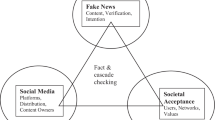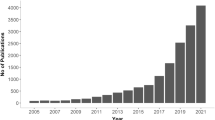Abstract
The impact of social media on information exchange is profound, providing valuable access to public information, but it can also intensify negative effects like cognitive bias, opinion extremism, and misinformation through the creation of echo chambers. These echo chambers, characterized by repeated information within closed systems, result from preferential exposure, homophily, and social impact. In this study, we present EchoSense, a framework that can conduct a comprehensive analysis of echo chambers on specific topics using both content and social network analysis and develop effective strategies to address the impact of echo chambers on public discourse and democratic processes. The objective of our developed framework is to serve as a comprehensive guide for detecting echo chambers, with a particular focus on the issue of racial discrimination and worker conditions in the Qatar World cup of 2022, For this purpose, over one million tweets were collected and stored, spanning from January 2022 to the beginning of the World Cup in Qatar. Through this comprehensive analysis, we aspire to contribute to a better understanding of echo chambers while addressing polarization concerns within online communities.











Similar content being viewed by others
Data availibility
The data sets generated and/or analyzed in this study are available from the corresponding author on reasonable request.
Code availability
All code for the echo chambers detection associated with the current submission is available at https://drive.google.com/drive/u/1/folders/1b_uJzg7_aUDBiFAew7zfYztQGPbT9nzs Any updates will also be published on Google Collab file, and the final DOI cited in the manuscript.
Notes
Examining a specific range of values becomes crucial in the context of illustrating the topology of the conversation graph. In this study, the weights assigned to edges take on integer values, representing the count of mentions within users’ tweets. This aligns with the upcoming discussion on the community detection algorithm, as detailed in the subsequent section.
QT / MT / RL: Quotes , Mentions and Replies
https://www.djangoproject.com/.. Django is a high-level Python web framework that is renowned for simplicity, robustness, and scalability. It offers a wide range of features and tools that can significantly streamline the development process.
References
Adhikary P, Sheppard ZA, Keen S, Van Teijlingen E (2017) Risky work: accidents among Nepalese migrant workers in Malaysia, Qatar and Saudi Arabia. Health Prospect 16(2):3–10
Alkhatnai M (2017) Vague language and its social role. Theory Pract Lang Stud 7(2), 122–127. https://doi.org/10.17507/tpls.0702.05
Amnesty International (2018) Qatar: migrant workers unpaid for months of work by company linked to World Cup host city. https://www.amnesty.org/en/latest/news/2018/09/qatar-migrant-workers-unpaid-for-months-of-work-by-company-linked-to-world-cup/
Amnesty International (2019) Reality Check MIgrant workers rights with two years to Qatar 2022 World cup. https://www.amnesty.org/en/latest/campaigns/2019/02/reality-check-migrant-workers-rights-with-two-years-to-qatar-2022-world-cup/
Arvidson M, Lyon F, McKay S (2013) Valuing the social? The nature and controversies of measuring social return on investment (SROI). Policy Press 4(1):3–18. https://doi.org/10.1332/204080513X661554
Bastian M, Heymann S, Jacomy M Gephi (2009) An open source software for exploring and manipulating networks. Third International AAAI Conference on Weblogs and Social Media 3(1):361–362
Blei D, Ng A, Jordan M (2003) Latent dirichlet allocation. J Mach Learn Res 3:601–608
Bonabeau E (2019) Decisions 2.0: the power of collective intelligence. MIT Sloan Manag Rev 50:2
Bozdag E (2015) Jeroen van dH: breaking the filter bubble: democracy and design. Ethics Inf Technol 14(4):249–265
Brannagan PM, Danyel R (2022). Qatar and the 2022 FIFA World Cup. Palgrave Macmillan, Palgrave
Calderon FH, Cheng LK, Lin MJ (2020) Content-based echo chamber detection on social media platforms. ASONAM ’19 414(1), 597–600. https://doi.org/10.1145/3341161.3343689
Campan A, T.M.T. Atnafu T (2018). Is data collection through twitter streaming API useful for academic research? IEEE International Conference on Big Data (Big Data)
Chen K, Duan Z, Yang S (2022) Twitter as research data, tools, costs, skill sets, and lessons learned. Cambridge University Press 41(1):114–130
Coletto M, Garimella K, Gionis A, Lucchese C (2017) A motif-based approach for identifying controversy. ICWSM. https://doi.org/10.48550/ar**v.1703.05053
Collier WL, Wiradi GS (1973) Recent changes in rice harvesting methods. Some serious social implications. Bull Indones Econ Stud 9(2):36–45. https://doi.org/10.1080/00074917312331332252
Coppedge M, Lindberg S, Skaaning SE, Teorell J (2016) Measuring high level democratic principles using the v-dem data. Int Polit Sci Rev 37(5):580–593. https://doi.org/10.1177/0192512115622046
Davies HC (2018) redefining filter bubbles as (escapable) socio-technical recursion. Sociol Res Online 23(3):637–654. https://doi.org/10.1177/1360780418763824
Dieter G (1988) Mechanical metallurgy. McGraw-Hill, Boston
Druck G, Mann G, McCallum A (2008) Learning from labeled features using generalized expectation criteria. Association for Computing Machinery, 595–602. https://doi.org/10.1145/1390334.1390436
Duseja N, Jhamtani H (2019) A sociolinguistic study of online echo chambers on Twitter. Association for Computational Linguistics, Minneapolis, Minnesota
Eriksson Krutrök M, Lindgren S (2022) Social media amplification loops and false alarms: towards a sociotechnical understanding of misinformation during emergencies. Commun Rev 25(2):81–95
Ewers MC, Diop A, Le KT et al (2020) Migrant worker well-being and its determinants: the case of Qatar. Soc Indic Res 152:137–163. https://doi.org/10.1007/s11205-020-02427-3
Fang X, Zhan J (2015) Sentiment analysis using product review data. J Big Data 2(5)
Felice P, Clementini E (2018) Topological relationships. Encyclopedia of Database Systems, 3140–3143
Felt A, Evans D (2008) Privacy protection for social networking platforms. IEEE Sympos Secur Privacy
Flaxman S, Goel S, Rao JM (2016) Filter bubbles, echo chambers, and online news consumption. Public Opin Quart 80(S1):298–320. https://doi.org/10.1093/poq/nfw006
Fuchs C (2011). Web 2.0, prosumption, and surveillance. Marketing, Consumption and Surveillance 8(3)
Fuhse JA (2009) The meaning structure of social networks. Sociol Theory 27(1):51–73
Garimella K, Morales F, Gionis A, Mathioudakis M (2016) Quantifying controversy in social media. Transactions on Social Computing (TSC) 1(1). https://doi.org/10.48550/ar**v.1507.05224
Godlner I, Bloom PBN (2023) Polarization and moral threat: insights from systemist analysis. Soc Sci 12:453. https://doi.org/10.3390/socsci12080453
Gomez-Vasquez L, Bernabel AP, Pujols R (2019) Promoting health topics: a case study of saludamerica on twitter. In: The 10th international multi-conference on complexity, informatics and cybernetics: IMCIC 2019
Gorgoglione M, Panniello U, Tuzhilin A (2019) Recommendation strategies in personalization applications. Inf Manag 56(6):103143. https://doi.org/10.1016/j.im.2019.01.005
Grace D, Ross M, Shao W (2014) Examining the relationship between social media characteristics and psychological dispositions. Eur J Mark 49(9–10):1366–1390. https://doi.org/10.1108/EJM-06-2014-0347
Guerra C, Meira W, Cardie C (2013) A measure of polarization on social media networks based on community boundaries. Proceedings of the International AAAI Conference on Web and Social Media 7(1):215–227
Henri F, Pudelko B (2003) Understanding and analysing activity and learning in virtual communities. J Comput Assist Learn 19(4):474–487. https://doi.org/10.1046/j.0266-4909.2003.00051.x
Jadin T, Gnambs T, Batinic B (2013) Personality traits and knowledge sharing in online communities. Comput Hum Behav 29(1):210–216. https://doi.org/10.1016/j.chb.2012.08.007
Javed MA, Younis MS, Latif S, Qadir J, Baig A (2018) Community detection in networks: a multidisciplinary review. J Netw Comput Appl 108(1–3):87–111. https://doi.org/10.1016/j.jnca.2018.02.011
Jiang H, Nachum O (2020). Identifying and correcting label bias in machine learning. Proceedings of the Twenty third international conference on artificial intelligence and statistics 108:702–712. https://doi.org/10.48550/ar**v.1901.04966
Karataş A, Şahin S (2018) Application areas of community detection: a review. 2018 International Congress on Big Data, Deep Learning and Fighting Cyber Terrorism (IBIGDELFT, 65–70. https://doi.org/10.1109/IBIGDELFT.2018.8625349
Kazutoshi S, Wen C, Hao P, Giovanni LC, Alessandro F, Filippo M (2019) Social influence and unfollowing accelerate the emergence of echo chambers. J Comput Soc Sci. https://doi.org/10.1007/s42001-020-00084-7
Lancichinetti A, Fortunato S (2009) Community detection algorithms: a comparative analysis. Phys Rev E 80:056117. https://doi.org/10.1103/PhysRevE.80.056117
McPherson M, Smith-Lovin L, Cook JM (2001) Birds of a feather: homophily in social networks. Ann Rev Sociol 27:415–444. https://doi.org/10.1146/annurev.soc.27.1.415
Mejova Y, Zhang AX, Diakopoulos N, Castillo C (2013) Controversy and sentiment in online news. Computation+Journalism Symposium. https://doi.org/10.48550/ar**v.1409.8152
Meneses Luis Fernando Santos (2021) Thinking critically through controversial issues on digital media: dispositions and key criteria for content evaluation. Think Skills Creat 42:597–600. https://doi.org/10.1016/j.tsc.2021.100927
Meo P, Messina P, Rosaci R, Sarnéc Giuseppe M.L. (2017) Forming time-stable homogeneous groups into online social networks. Eur J Market 414(1):117–132. https://doi.org/10.1016/j.ins.2017.05.048
Micarelli A, Gasparetti F, Sciarrone F, Gauch S (2007). Personalized search on the World wide Web the adaptive web methods and strategies of web personalization, 195–230 https://doi.org/10.1007/978-3-540-72079-9_6
Murugesan S (2007) Understanding web 2.0. IT Professional 9(4), 34–41
Natarajan N, Chaoji V, Prithviraj S (2013) Community detection in content-sharing social networks. ASONAM ’13, 82–89. https://doi.org/10.1145/2492517.2492546
Newman MEJ (2006) Modularity and community structure in networks. Proc Natl Acad Sci USA. https://doi.org/10.1073/pnas.0601602103
Newman MEJ, Reinert G (2016) Estimating the number of communities in a network. Phys Rev Lett 117(7)
Paolo F, Antonio G (2005) A personalized search engine based on web-snippet hierarchical clustering. Assoc Comput Mach 2(3):801–810. https://doi.org/10.1145/1062745.1062760
Pariser E (2011) The filter bubble: how the new personalized web is changing what we read and how we think. Penguin
Pozzi F, Fersini E, Messina E, Bing L (2016) Sentiment analysis in social networks. Numer Math 221(6):152–154
Russo GA, Avelino G, Guarnieri FH (2022) Democratic principles and performance: What do the experts think? J Polit Latin Am 14(2):224–236. https://doi.org/10.1177/1866802X221107032
Salvatore C, Biffignandi S, Bianchi A (2021) Social media and twitter data quality for new social indicators. Soc Indic Res 156(2):601–630
Sasahara K, Chen W, Peng H (2021) Social influence and unfollowing accelerate the emergence of echo chambers. J Comput Soc Sci 4(345):381–402. https://doi.org/10.1007/s42001-020-00084-7
Shoeibi N, Shoeibi N, Chamoso P, Alizadehsani Z, Corchado JM (2022) A hybrid model for the measurement of the similarity between twitter profiles. Sustainability 14(9):4909
Spohr D (2017) Fake news and ideological polarization: filter bubbles and selective exposure on social media. Bus Inf Rev 34(3):150–160. https://doi.org/10.1177/0266382117722446
Steinhaeuser K, Chawla NV (2008) Community detection in a large real-world social network. Soc Comput Behav Model Pred https://doi.org/10.1007/978-0-387-77672-9_19
Subba D (2014) Democratic values and democratic approach in teaching: a perspective. Am J Educ Res 2(12A):37–40. https://doi.org/10.12691/education-2-12A-6
Surya L (2018) Streamlining cloud application with AI technology. Int J Innov Eng Res Technol 5(10)
Terren L, Borge R (2021) Echo chambers on social media:a systematic review of the literature. Review of Communication Research 9(1)
Wald C, Pfahler L (2023) Exposing bias in online communities through large-scale language models. Comput Soc https://doi.org/10.48550/ar**v.2306.02294
Weeks BE, Lane DS, Kim DH, Lee SS, Kwak N (2017) Incidental exposure, selective exposure, and political information sharing: integrating online exposure patterns and expression on social media. J Comput-Mediat Commun 22(6):363–379. https://doi.org/10.1111/jcc4.12199
Weller K (2016) Trying to understand social media users and usage: the forgotten features of social media platforms. Online Inf Rev 40(2)
Wilson C, Bryce B, Allesandra S, Puttaswamy K, Zhao BY (2009) User interactions in social networks and their implications. EuroSys ’09: Proceedings of the 4th ACM European conference on Computer systems 205–218. https://doi.org/10.1145/1519065.1519089
**a F, Liu J, Nie H et al. (2020) Random walks: a review of algorithms and applications. IEEE Trans Emerg Topics Comput Intell 4(2):97–105. https://doi.org/10.1109/TETCI.2019.2952908
Ye Q, Wu B, Wang B (2010). Distance distribution and average shortest path length estimation in real-world networks. In: ADMA 2010: advanced data mining and applications 6440:322–333
Yuan C, Yang H (2019) Research on k-value selection method of k-means clustering algorithm. J 2:226–235 . https://doi.org/10.3390/j2020016
Author information
Authors and Affiliations
Contributions
Both DCK and KG contributed to the writing, review, editing and validation. EA provided supervision and validation for the project. DCK contributed in data curation, data analysis, visualization and software development. KG was responsible for project administration and conceptualization. All authors reviewed and commented on further versions of the article. All authors read and approved the final article
Corresponding author
Ethics declarations
Conflict of interest
No conflicts of interest to declare.
Additional information
Publisher's Note
Springer Nature remains neutral with regard to jurisdictional claims in published maps and institutional affiliations.
Rights and permissions
Springer Nature or its licensor (e.g. a society or other partner) holds exclusive rights to this article under a publishing agreement with the author(s) or other rightsholder(s); author self-archiving of the accepted manuscript version of this article is solely governed by the terms of such publishing agreement and applicable law.
About this article
Cite this article
Kavargyris, D.C., Georgiou, K. & Angelis, L. EchoSense: a framework for analyzing the echo chambers phenomenon: a case study on Qatar events. Soc. Netw. Anal. Min. 14, 113 (2024). https://doi.org/10.1007/s13278-024-01275-0
Received:
Revised:
Accepted:
Published:
DOI: https://doi.org/10.1007/s13278-024-01275-0




